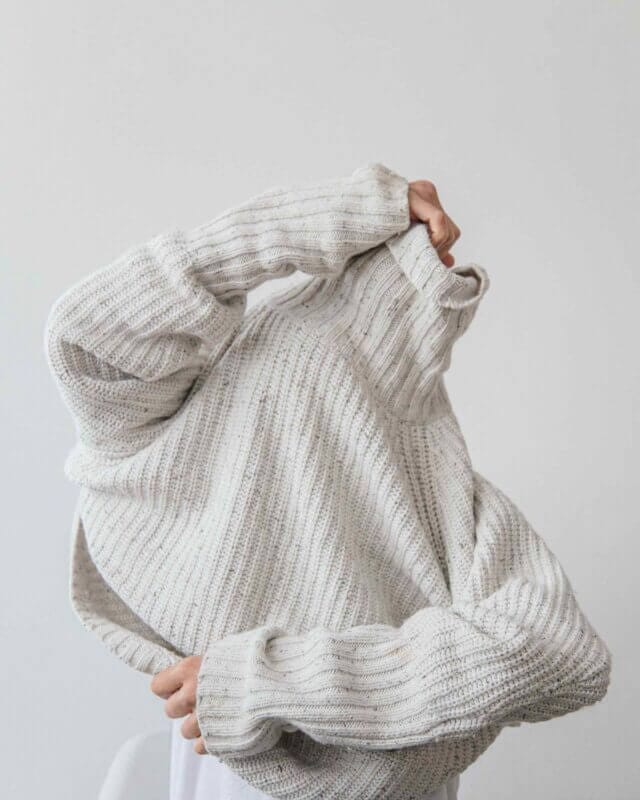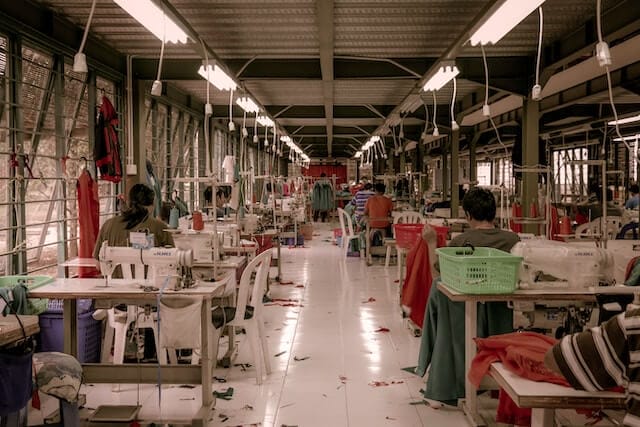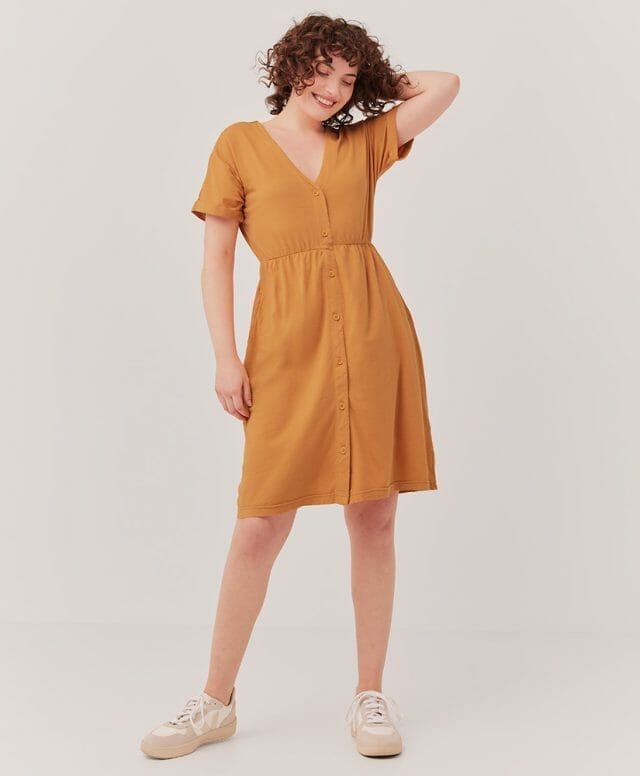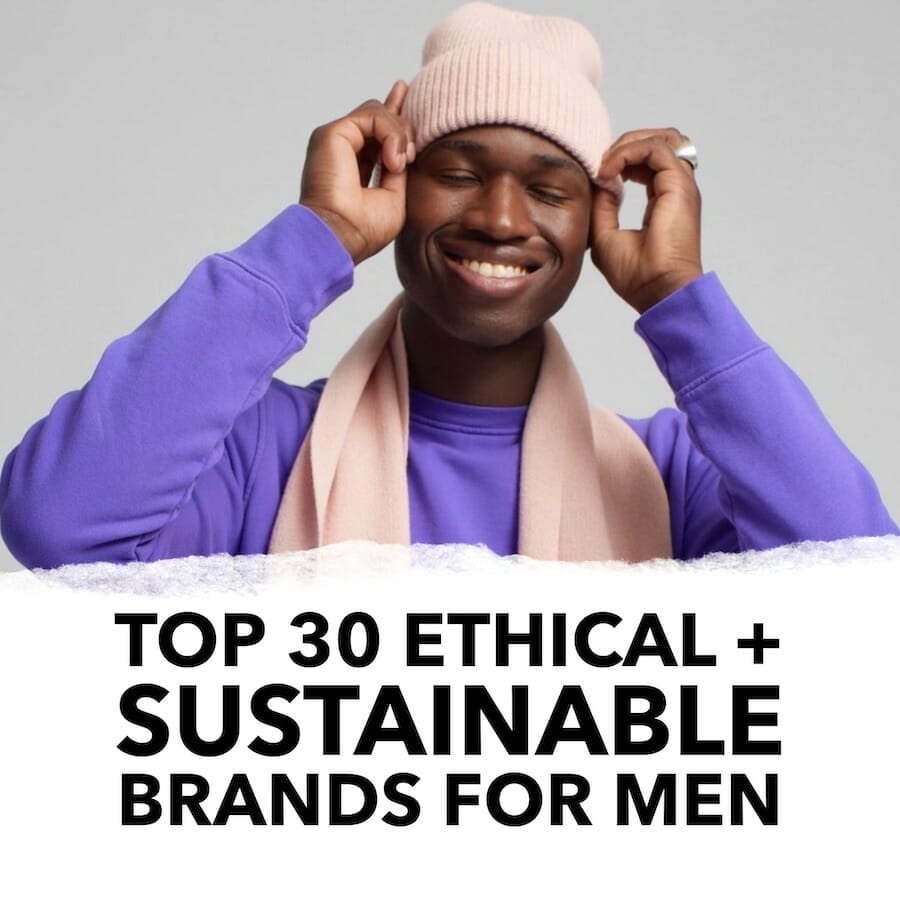
What is Cider?
It is a direct-to-consumer womenswear brand whose aesthetic and business are geared toward Gen Z consumers. They claim to have clothing for everyone everywhere and to cover every mood. Cider is a fashion brand with offices in LA and factories in China that was founded by friends involved in the world of tech and fashion, back in 2020.
Is Cider Sustainable?
It is not. At its core, Cider is still promoting overproduction and overconsumption by dropping weekly styles according to mood.
It does not have any programs to reclaim its products. It greenwashes by saying that the pieces of their recycled collection are made of recycled certified materials when in truth they are blended with other fabrics like polyester. Let’s get into the details of their sustainability to see why.
The Sustainability of Cider’s Business Model
The brand says it uses a “smart fashion model” where they make products with consumer’s real-time data on what they really intend to buy. This allegedly allows them to divert waste. It is not clear what amount of waste they divert if they are still making weekly style drops to satisfy having fashion for every mood. This is greenwashing.
It is also a social-first brand, with 4M followers on Instagram and 857+ K followers on TikTok. It has been documented that platforms like TikTok promote passing micro trends that encourage people to change their whole style in less than a month.
Trends are, of course, one of the categories that Cider promotes not just on social with its Cidergang of influencers, but also on their own blog. It has guides on how to dress Bore-core or Coastal Cowgirl, for example. This focus on trends further promotes the notion that clothes are disposable, and so are raw materials and the people who make them.

Additionally, the brand does not show any initiatives in repair, circular fashion, take back programs, donation, or recycling of its products, thereby leaving the responsibility of the end of life of the garment to the end consumer, which more often than not means their clothes will end up in a landfill, producing methane and CO2, which contribute to our climate emergency.
Is Cider’s Clothing Sustainably Made?
Cider prides itself on making products with Global Recycled Standard Certified fabrics like recycled cotton or polyester but it’s only a specific collection in a myriad of products. Not to mention the articles labeled as such are not made 100% from said recycled fabric, most are mixed with spandex, rayon, and polyester.
When you produce with recycled PET you have to be aware of the microplastic shedding that happens when consumers wash their clothes and that plastic ends up in our oceans and drinkable water supply. Nowhere does it talk about how to solve that issue with a washing bag or a filter.

Cider also does not have any policies around hazardous chemicals in its clothing. With elements such as lead, PFAs or phthalates constantly found in clothes from fast fashion brands, we worry that Cider might be another one leaving traces of these to get into our skin, causing all sorts of liver and endocrine diseases.
Even though Cider does not use leather or real fur, it does not account for the environmental issues of non-leather alternatives, like PVC-made products, that it uses for its faux leather.
The company does not mention working with its raw material producers on more regenerative or organic practices and does not have any policies or goals that protect the people who made the fabrics or harvested the raw materials.
It also does not show any commitments to reducing CO2 emissions. What it says on water is rather vague, it only talks about water reduction strategies but it does not say which strategies it uses. It does show, however, that its suppliers use water membrane treatment technology.
Additionally, its packaging is made by Symphony Environmental to be biodegradable. The EU has warned against this particular type of plastic, oxo-degradable, that it does not degrade quite as fast as advertised, and that it can become fragmented into microplastics that have not been proven to biodegrade.

Is Cider Transparent About Their Supply Chain?
Cider only shows an example of three tier 1 manufacturing suppliers, which are audited by SMETA and SEDEX. It shares its factory names, number of employees, specialty, and whether they have any responsibility practices. The rest of their suppliers are absent from their website.
It does have a code of conduct with topics like human rights, safety, environment, and integrity. Also not available, is clear information on what happens if any of the manufacturers violates any of the points in the Zero Tolerance Policy or how exactly it remedies violations or enforces the policy.
Overall it is doing better than other fast fashion brands in at least disclosing some of its factories, but it is not enough for us to say that they are a transparent brand.
Is Cider Ethical?
Cider not only does not pay a living wage, it has been accused of appropriating other creators’ designs. It does, however, make an effort in the plus size front, with its extended size collection. Let’s get into the details of their ethics.
Does Cider Use Fair Labor Conditions?

Even though the brand says in its policy that its suppliers must not pay less than the local minimum wage, it does not take into account how low some minimum wages are in the Global South and how that keeps people in poverty.
In Guangdong and Jiangsu, where some of its suppliers are, the minimum monthly wage is US$275. Compare this to a living wage recorded by the Global Living Wage Coalition in Shanghai, which is USD$725 and you will see it is nowhere near it. The brand also does not show any intention of wanting to work with the suppliers to pay its garment workers living wages.
Additionally, Cider does not have any information on community-benefiting endeavors and it has in fact been accused of cultural appropriation of Chinese traditional garments and stealing styles from local designers like @crohetbao or @lydiabolton.
DEI
Cider says that 60% of leadership roles within its team identify as female. It does not refer to its headquarters or manufacturing. Nor does it show any specific strategies for advancing gender equality. It has nothing regarding race either.
The brand does have clothing that goes up to 4XL in a specific Plus section, which is a 24-26. The rest of the store has some items in 24, some that you have to pre-order to get a 26, and others like pants that don’t go further than 10.
Is Cider Fast Fashion?

Fast Fashion models are based on churning out insane amounts of trendy disposable clothing, offered at low prices, which are achieved by underpaying garment workers. In so far as it promotes an incessant cycle of trends and overconsumption, Cider is indeed fast fashion.
Fast Fashion Brands Similar to Cider
Now that we know Cider isn’t a sustainable choice and that the brand is fast fashion, you may be wondering what other brands are fast fashion. Check out our guide for 50 fast fashion brands to avoid.
Is Cider Clothing like Shein?
Cider and Shein are both fast fashion brands. We also don’t recommend supporting either brand. If you’d like to get more into the details check out our rating of Shein.
Which Brands Are Not Fast Fashion?
At Eco-Stylist we research brands to find the most ethical and sustainable brands for you to support. As part of that, none of the brands we certify and recommend are fast fashion. Check out our brand directory to discover over 100 non fast fashion brands.
Ethical and Sustainable Fashion Alternatives to Cider
You do not have to give up on your love of fashion because of Cider’s ambivalent practices. At Eco-Stylist we have done the work for you to search for the most ethical alternatives for you to dress like you give a damn.
Here’s our top 3 ethical alternatives to Cider.
1) Sustainable Fashion Brand: Pact

For your basics, undies, joggers, sleepwear, and hoodies, look no further, this brand makes Fair Trade basics from certified organic cotton.
2) Slow Fashion Brand: Boldwill

If you are into sports or just athleisure, Boldwill has got your back with clothing that is entirely plastic-free, not even the recycled variety. This means no microplastics will get from your leggings to your water!
With Boldwill, you get clothing made to sweat and save the planet with fabrics like hemp that reduce water usage and sequester CO2.
3) Ethical Brand: Frankie Collective

If you are in the street-style mood, Frankie Collective upcycles vintage in its own factory, paying all workers a living wage.

Adela is a Colombian storyteller, content maker, strategy consultant, & event producer, specializing in sustainable fashion, mental health, and gender issues.










3 thoughts on “Is Cider Fast Fashion? Are they Ethical and Sustainable or Just Greenwashing?”
And just who are you to reccommend, or not, the likes of Shein, Cider etc… I have seen the pricetag of your clothing. YOUR jeans $200. Shein etc $20, (if that).
And, no doubt, your $200 item is made side by side the $20 one.
Hi Linda. If you read the article it’s pretty clear how brands like Cider and Shein exist on unsustainable practices and exploited labor. The brands we recommend are researched and certified for their ethics and sustainability.
The $200 jeans you reference are probably Nudie Jeans and these jeans include free repairs for life. They are also made more sustainably, by people paid fairly, and the quality is many many times better than Shein. The two are not comparable and not made in the same factory.
The two are not comparable and not made in the same factory